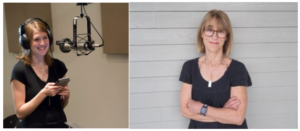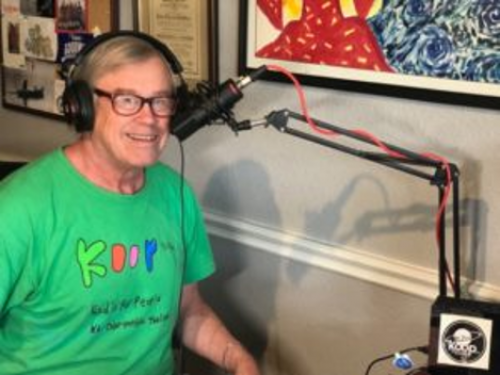John Hoffner started at KOOP in 2007. Nowadays, he and his co-hosts present The Austin Common Radio Hour. We spoke on October 14.
Michael A. Brown: Talk about the background and evolution of your show, The Austin Common Radio Hour.
John Hoffner: My interest in radio started when I was a kid in New Jersey. My mom listened to WBAI in New York, one of the early Pacifica public radio stations, while we were getting ready for school. At Tufts University in Boston, I was an engineering major but still had a big interest in public radio. So I took a broadcast journalism course and was inspired learning about greats like Edward R. Murrow and Fred Friendly. I signed on to do news with the Tufts radio station, WMFO. Here in Austin in 2007, I came to KOOP as the present studio was being built. I met up with Ken McKenzie-Grant and we hatched an idea for an environmental show called Shades of Green. We did that show for almost 15 years and then decided on a new show, the Austin Common Radio Hour.
MAB: Tell us about your show colleagues Amy Stansbury and Jane Pulaski.

JH: The name of the show comes from The Austin Common, where Amy works, and it’s a cooperative between them and KOOP. Austin Common is a news feed to get millennials involved in civic engagement. Amy is a terrific resource about that, and I focus on environmental issues. I met Jane when I was working at the City of Austin electric utility, doing solar and wind projects, and she was working for the state on energy and environmental matters. Both of us have interviewed some of the people involved for many years in renewable energy and solar.
MAB: Which topics and shows have drawn the most listener responses and how come?
JH: I’d say most response and interest has been to our series about elections. Every election, we run candidate forums, and we’re doing those right now for Austin city council and mayor. Amy conducts 12-minute rapid-fire question and answer segments with the candidates, and we get a lot of response to that.
MAB: You’ve been with KOOP for 15 years … what would you say are the biggest changes over that time in the station’s News and Public Affairs programming?
JH: It’s a lot more organized than back in 2007 when N/PA programmers were kind of in their own little worlds. Nowadays, we’re becoming more cohesive as a N/PA Team. We’re developing new plans, policies, and protocols. That’s a big deal because the really important part of public radio is the News and Public Affairs component.
MAB: You prepare and submit the quarterly reports that KOOP files with the FCC. What’s in those reports and how important are they?
JH: They’re very important because they are a requirement for our broadcast license. We have to prove to the FCC that we are engaged in the community in events and topics that are important to the community … Covid 19 for example. N/PA programmers inform the FCC by reporting their guests and the guests’ organizations, the local issues covered, and how those aspects are consistent with KOOP’s mission as a community radio licensee. (Note: this a requirement for N/PA shows only, not music/entertainment programming.)
MAB: Of all the FCC rules KOOP must abide by, which do programmers misunderstand most often?
JH: Ambiguity about what you can and can’t say on the air, especially about calls to action. We train N/PA programmers to avoid active verbs that direct or urge listeners to do something. And we have to advise guests of that rule. They may say passive verbs, such as “you can learn more about our organization at (URL) … but they can’t say “visit our web site.” Commercial guests may want to “pitch” their product or service and we can’t let them do that.
MAB: You are quite prominent in the community for your work with green energy. What’s happening nowadays with those efforts?
JH: I work for an engineering company where I lead their global solar projects with companies, communities, and governments. There’s a lot of interest and activity currently because of the Inflation Reduction Act, with new incentives and a push for renewable energies. For example, we’re working a big project with water treatment facilities where energy costs and carbon footprints are urgent matters.
MAB: What’s coming up on The Austin Common Radio Hour?
JH: On October 19, we host author Andy Bowman, who has written a book called “The West Texas Power Plant That Saved the World.” And then prior to the November election, we’ll do a couple more shows about Austin city council candidates.
You can hear The Austin Common Radio Hour every Wednesday at 2pm.
Interview by Michael A. Brown
